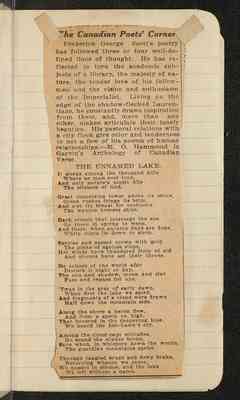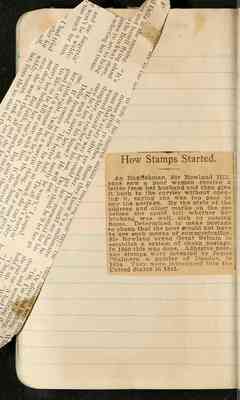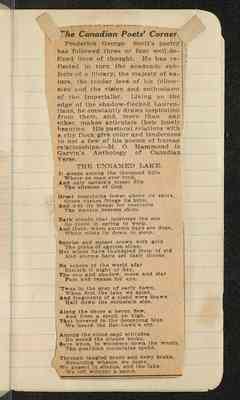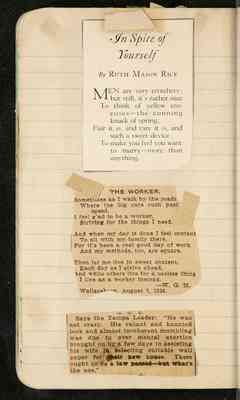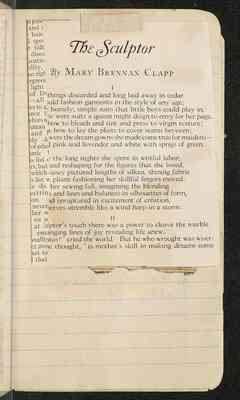Pages
191
[paper clipping attached to page] The Canadian Poet's Corner Frederick George Scott's poetry has followed three of four well-defined lines of thought. He has reflected in turn the academic subjects of a library, the majesty of nature, the tender love of his fellowmen and the vision and enthusiasm of the Imperialist. Living on the edge of the shadow-flecked Laurentians, he constantly draws inspiration from them, and, more than any other, makes articulate their lonely beauties. His pastoral relations with a city flock give color and tenderness to not a few of his poems of human relationships.---M.O. Hammond in Garvin's Anthology of Canadian Verse.
THE UNNAMED LAKE
It sleeps among the thousand hills Where no man ever trod, And only nature's music fills The silences of God.
Great mountains tower above its shore, Green rushes fringe its brim, And o'er its breast for evermore The wanton breezes skim.
Dark clouds that intercept the sun Go there in spring to weep, And there, when autumn days are done, White mists lie down to sleep.
Sunrise and sunset crown with gold The pinks of ageless stone, Her winds have thundered from of old And storms have set their throne.
No echoes of the world afar Disturb it night or day, The sun and shadow, moon and star pass and repass for aye.
'Twas in the grey of early dawn, When first the lake we spied, And fragments of a cloud were drawn Half down the mountain side.
Along the shore a heron flew, And from a speck on high, That hovered in the deepening blue, We heard the fish-hawk's cry.
Among the cloud-capt solitudes, No sound the silence broke, Save when, in whispers down the woods, The guardian mountains spoke.
Through tangled brush and dewy brake, Returning whence we came, We passed in silence, and the lake We left without a name.
192
[Newspaper Clipping]
How Stamps Started.
An Englishman, Sir Rowland Hill, once saw a poor woman receive a letter from her husband and then give it back to the carrier without opening it, saying she was too poor to pay the postage. By the style of the address and other marks on the envelope she could tell whether her husband was well, sick or coming home. Determined to make postage so cheap that the poor would not have to use such means of communication, Sir Rowland urged Great Britain to establish a system of cheap postage. In 1840 this was done. Adhesive postage stamps were invented by James Chalmers, a printer in Dundee, in 1834. They were introduced into the United States in 1841.
193
[paper clipping attached to page]
The Canadian Poets' Corner Frederick George Scott's poetry has followed three or four well-defined lines of thought. he has reflected in turn the academic subjects of a library, the majesty of nature, the tender love of his fellowmen and the vision and enthusiasm of the Imperialist. Living on the edge of the shadow-flecked Laurentiansn he constantly draws inspiration from them, and, more than any other, makes articulate their lonely beauties. His pastoral relations with a city flock give color and tenderness to not a few of his poems of human relationships. ---M. O. Hammond in Garvin's Anthology of Canadian Verse.
THE UNNAMED LAKE.
It sleeps among the thousand hills Where no man ever trod, And only nature's music fills The silences of God.
Great mountains tower above its shore, Green rushes fringe its brim. And o'er its breast for evermore The wanton breezes skim.
Dark clouds that intercept the sun Go there in spring to weep, And there, when autumn days are done, White mists lie down to sleep.
Sunrise and sunset crown with gold The pinks of ageless stone, Her winds have thundered from of old And storms have set their throne.
No echoes of the world afar Disturb it night or day, The sun and shadow, moon and star Pass and repass for aye.
'Twas in the grey of early dawn, When first the lake we spied, And fragments of a cloud were drawn half down the mountain side.
Along the shore a heron flew, And from a speck on high, That hovered in the deepening blue, We heard the fish-hawk's cry.
Among the cloud-capt solitudes, No sound the silence broke, Save when, in whispers down the woods, The guardian mountains spoke.
Through tangled brush and dewy brake, Returning whence we came, We passed in silence, and the lake We left without a name.
194
[Newspaper Clipping]
In spite of Yourself
By RUTH MASON RICE
MEN are very crochety; but still, it's rather nice To think of yellow crocuses - the cunning knack of spring; Fair it is, are rare it is. and such a sweet device To make you feel you want to marry - more than anything.
THE WORKER. Sometimes as I walk by the roads Where big cars rush past speed, I feel glad to be a worker. Striving for the things I need.
And when my day is done I feel content To sit with my family there, For it's been a real good day of work And my methods, too, are square.
Then let me live in sweet content, each day as I strive ahead, And while others live for a useless thing I live as a worker instead. --W.G.H. Wallacebung, August 7, 1923
Says the Yampa Leader: "He was not crazy. His vacant and haunted look and almost incoherent mumbling was due to over mental exertion brought on by a few days in assisting his wife in selecting suitable wall paper for their new house. THere ought to be a law pased - but what's the use."
195
[paper clipping attached to page - reads as followed, some words on the left are not complete due to letter's being missing]
The Sculptor
By MARY BRENNAN CLAPP
1 things discarded and long laid away in cedar [ould?] fashion garments in the style of any age; homely, simple suits that little boys could play in, ne were suits a queen might deign to envy for her page. how to bleach and tint and press to virgin texture; w how to lay the plaits to cover seams between; were the dream gowns she made come true for maidens--- d pink and lavender and white with sprigs of green.
the long nights she spent in wistful labor, and reshaping for the figures that she loved, fancy pictured lengths of silken, shining fabric pliant fashioning her skillful fingers moved. her sewing fall, imagining the blending and lines and balances in silhouettes of form, nd enraptured in excitement of creation, nerves atremble like a wind harp in a storm.
II ptor's touch there was a power to cleave the marble inging lines of joy revealing life anew. ius!" cried the world. But he who wrought was wiser: e thought, "is mother's skill in making dreams come
